#cephalaspidea
Explore tagged Tumblr posts
Text
Taxonomy Tournament: Gastropods


Cephalaspidea. This order is made up of headshield slugs, so-called because they have a broadening of the head used to plow beneath sand
Nudipleura. This superorder is made up of sea slugs, which are typically colourful. Members include the sea bunny, variable neon slug, and blue dragon
#animals#biology#polls#poll tournament#zoology#sea slugs#headshield slugs#gastropods#molluscs#spiralia#Cephalaspidea#Nudipleura#0x66v0x99#animal tournament#Animal Tournament Round 1
41 notes
·
View notes
Text

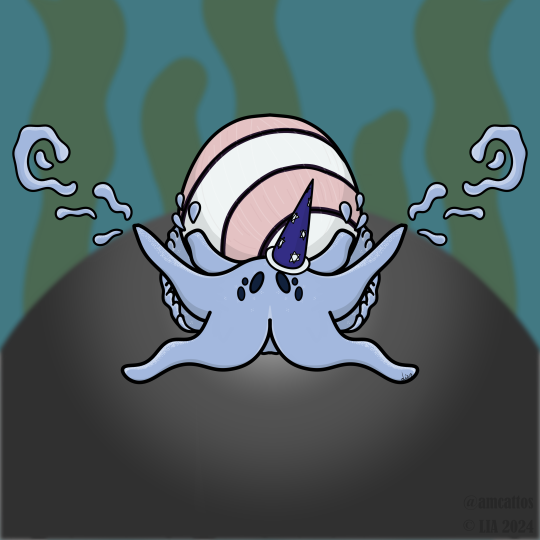

© LIA 2024
Beri The Bubble Snail
(Hydatina amplustre)
I had a lot of fun with this one. He's a wizard specialising in slime and bubble magic!
Bubble snails (order Cephalaspidea) are a group of marine snails with soft shells and are often brightly coloured. This species is most commonly known as the Royal Paperbubble, which is both ridiculous and adorable. First described by Linnaeus in his 1758 edition of Systema Naturae, the Royal Paperbubble can be found on shallow reefs in the Tropical Indo-West Pacific and is a predator suspected to feed on a group of polychaete worms. Unlike other snails you may be aware of, members of Beri's family (Aplustridae) cannot hide in their shells because they are too small.
Get him on Redbubble!
#illustration#digital illustration#art#digital art#wildlife conservation#snail#marine#marine life#bubble snail#wizard#marine snail#ocean#coral reef
4 notes
·
View notes
Text
I was just looking stuff up about bubble snails

req'd by @justfortalkingtofriends
how's the little mermaid production goin?
text: life is the bubbles!
130 notes
·
View notes
Photo

California bubble snail (Bulla gouldiana)
Photo by Marlin Harms
#california bubble snail#cloudy bubble snail#bulla gouldiana#bulla#bullidae#bulloidea#cephalaspidea#tectipleura#euthyneura#heterobranchia#gastropoda#mollusca#lophotrochozoa
25 notes
·
View notes
Photo
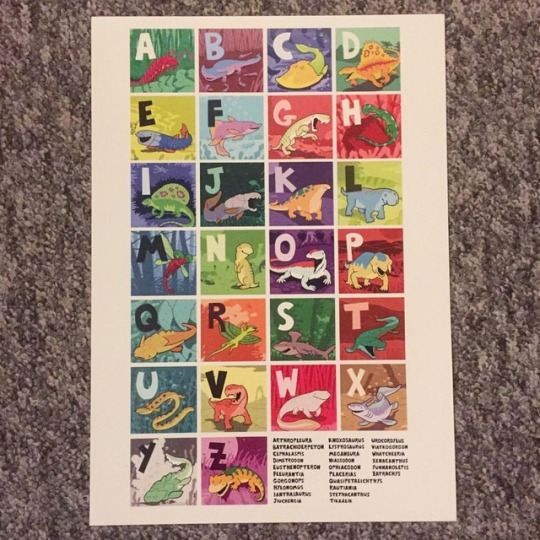
Prehistoric alphabet poster 2! It includes creatures from the Devonian, Carboniferous, Permian and Triassic periods. You can buy this in my Etsy shop. Link is in my bio! #palaeontologist #palaeontology #devonian #devonianperiod #carboniferous #carboniferousperiod #fossils #arthropleura #diplocaulus #cephalaspidea #cephalaspis #dimetrodon #eusthenopteron #dunkleosteus #gorgonopsid #meganeura #lystrosaurus #dicynodont #ophiacodon #placerias #tiktaalik #eryops #stethacanthus #hylonomus #naturalhistory #naturalhistorymuseum #etsy #etsyshop #etsyseller #etsysellersofinstagram #handmade #posters #alphabet https://www.instagram.com/p/BtvuCGLnpvk/?utm_source=ig_tumblr_share&igshid=5629pyszc1f4
#palaeontologist#palaeontology#devonian#devonianperiod#carboniferous#carboniferousperiod#fossils#arthropleura#diplocaulus#cephalaspidea#cephalaspis#dimetrodon#eusthenopteron#dunkleosteus#gorgonopsid#meganeura#lystrosaurus#dicynodont#ophiacodon#placerias#tiktaalik#eryops#stethacanthus#hylonomus#naturalhistory#naturalhistorymuseum#etsy#etsyshop#etsyseller#etsysellersofinstagram
0 notes
Text
Sea Slugs on the Elkhorn Slough - Observation of the Week, 7/7/19
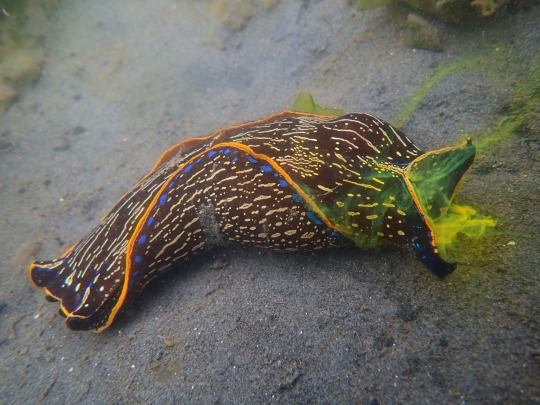
Our Observation of the Week is this Navanax inermis sea slug, seen in the United States by lmkitayama!
“At work they call me the Slug Queen,” says Lauren Kitayama, an Assistant Manager at Kayak Connection in California. “Daylight permitting, I paddle once a week before work on the Elkhorn Slough. A couple of years ago, if you'd asked any of the local guides they might have said there were 5 species of sea slug on the slough. Last year I documented 27!”
The slug seen above was one of twenty Navanax inermis she spotted that morning, and said they were mating on the sea lettuce near the dock at work. “They are one of my favorite slugs,” she says,
They are large enough for people to appreciate, and so absolutely beautiful! I love using them to get people excited about the unloved slimy things that live in the ocean. One of my goals is always to show people something they never even imagined existed on the planet, and Navanax are a great opportunity to do that. As a kayak guide I work with a lot of school children, and love having the chance to inspire them to protect and appreciate the natural world around them.
While nudibranchs are the most commonly known order of sea slug, the Navanax inermis belongs to an entirely different order: Cephalaspidea, or the headshield slugs. Most members of this order, including the California Aglaja, do have a shell, but it is usually either tiny or internal. Navanax inermis are large slugs, growing anywhere from 2.5 to 10 inches (6.35 - 25.4 cm) in length, and they prey upon other gastropods and even small fish!
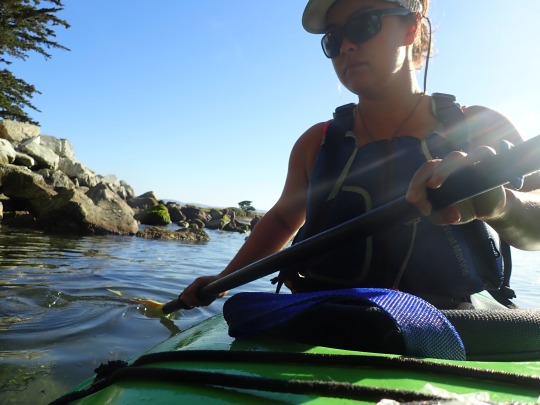
Lauren (above) earned a Masters in Marine Conservation from the University of Miami (FL), where she focused on the impacts of marine debris. “I am zealous about protecting the oceans from plastic...[and] someday I hope to work for the UN attacking the plastic pollution problem in Southeast Asia.” For now, however, she says she loves her current job, and tells me
My favorite thing is to see something I've never seen before. "I don't know" is my favorite answer to the question, "what is it?" I think that's how this whole slug thing started. They are beautiful, and most people would never look for them/see them without a guide. For whatever reason my slug observation skills are great. Can't find my keys half the time (or the sunglasses that are on my head), but a 9 mm sea slug hiding in a patch of kelp... no problem.
With my ecologist brain, I am excited to continue documenting slugs on the slough to see if a temporal pattern emerges (when are particular species showing up? Are they predictably in the same locations year after year?) I try very hard to get a photo of every species I see every week so that I can continue to document their presence/absence on the slough.
- by Tony Iwane.
>
- Check out Lauren’s Litter Mermaid projects and blog!
- And her sea slug observations.
- Watch a Navanax inermis eating a California Seahare.
- And watch a pair mating!
14 notes
·
View notes
Photo
seatrench: California Aglaja (Navanax inermis) The Californian Aglaja is a large species of predatory sea slug. Despite appearances, it is not a nudibranch and belongs to a group called Cephalaspidea, or the shieldhead slugs. Having no eyes, it hunts by tracking the slime trails of other sea slugs with chemoreceptors. (Source)


#sea slug#sea slugs#predatory#predatory sea slug#predatory sea slugs#californian aglaja#gastropod mollusc#gastropod molluscs#navanax#navanax inermis#cephalaspidea#shieldhead slug#shieldhead slugs#opisthobranch#animal#animals#gif#gifs#close-up#nature
3K notes
·
View notes
Text
cephalaspidea replied to your post “i’d seriously pay a fee every time i walked into a mall if it meant...”
Dude I have the same problem at the mall in my area. Especially if I made accidental eye contact. I avoid them like crazy.
at one of the malls in Nashville they have so many fucking kiosks and it seems like 60% of them are they same company and boy to they tell their employees to go after people. they literally follow you until you get to the next kiosk, shouting at you the whole time, where you then have to deal with that person.
i honestly tried being nice to them the first dozen or so times i went to the mall but it seemed to only make it worse so now i either totally ignore them and speed walk or i say “no please leave me alone.” both methods don’t work but it works better than being nice to them.
#cephalaspidea#it makes me feel like a total ass but leave me the fuck alone#i dont want to buy a straightener or#perfume or whatever the fuck else youre selling#Sam posts things
0 notes
Photo
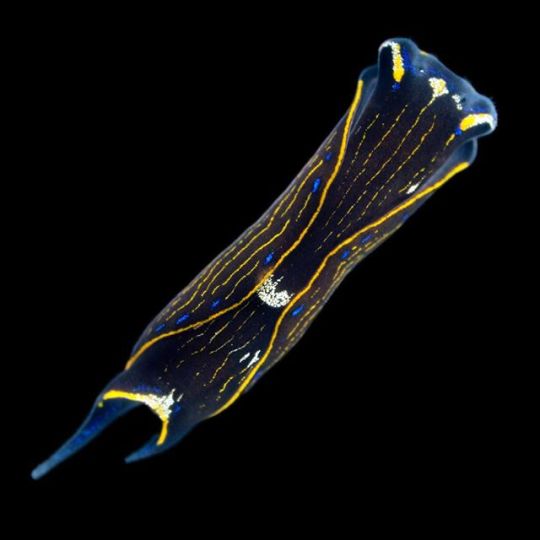
drverm⠀ •Maerl Series (San Clemente Island)🔹Navanax inermi is a large predatory sea slug species. Navanax is not a nudibranch; it belongs to a group called head shield slugs and snails (Cephalaspidea). This one is a juvenile, only 1 cm long, living in the maerl (rhodolith bed) and no doubt creating havoc as it eats all the other denizens of this habitat. Navanax inermi was named by James Cooper in 1862⠀ https://en.wikipedia.org/wiki/James_Graham_Cooper🔹⠀⠀ 🦑⠀⠀ 🐙⠀⠀⠀⠀⠀⠀⠀⠀⠀ 🦐⠀⠀⠀⠀⠀⠀ 🦀⠀⠀⠀⠀⠀⠀⠀⠀⠀⠀⠀⠀⠀ 🦐⠀⠀⠀⠀⠀⠀ 🐙⠀⠀⠀⠀⠀⠀⠀⠀⠀ #Navanax #SanClementeIsland #California #maerl #mollusc #gastropod #cephalaspidea #scrippsoceanography #scrippscollections #oceanography #microscopy #ucsd #ucsandiego⠀ — view on Instagram https://ift.tt/2ZdOPY4
0 notes
Text
Fun fact: The relationship between nudibranchs and sea slugs is like that of squares and rectangles: all nudibranchs are sea slugs, but not all sea slugs are nudibranchs. Nudibranchs are a specific group of sea slug that have exposed gills on their back that are shaped into colorful plumes. They are also bilaterally asymmetrical, meaning that they have sexual openings on the right side of their body but not the left side.

The Chelidonura hirundinina is not a nudibranch - still, this colourful headshield slug can grow up to 4 cm long, and lives in the western Indo-Pacific. See the little hairs around the edge of its head (closest to the camera)? Those are cilia, and are used as sensors to detect their prey: flatworms. This species is also known as the Swallowtail Headshield slug, because of its split back end.
Photo source
#Chelidonura hirundinina#Cephalaspidea#Aglajidae#headshield slugs#sea slugs#GASTROPODS#mollusks#invertebrates#marine fauna#marine invertebrates#coral reefs#coral reef invertebrates#indian ocean#Pacific Ocean#benthic fauna#benthic invertebrates
597 notes
·
View notes
Photo

Chelidonura varians.
2 notes
·
View notes
Photo

Chelidonura mandroroa.
2 notes
·
View notes
Photo

Chelidonura electra.
2 notes
·
View notes
Photo

Chelidonura inornata.
2 notes
·
View notes
Photo

Chelidonura alisonae.
3 notes
·
View notes
Photo

Philinopsis lineolata.
1 note
·
View note